| Srl | Item |
| 1 |
ID:
139628
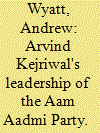

|
|
|
|
|
| Summary/Abstract |
The Aam Aadmi Party (AAP) made its national debut in 2014. Arvind Kejriwal, the National Convenor and a founding leader of the AAP, had a decisive impact on the character of the party. This paper reflects on the significance of Kejriwal's leadership in relation to the literature on party systems and political leadership. In 2014, he attempted to open up a new political cleavage and add a new party to the national party system. His entrepreneurial activity drew attention to the issues of corruption and governance. Kejriwal's political leadership is assessed in terms of his ability to set objectives for the party, his interaction with followers, his efforts to represent those followers and the development of party institutions. Kejriwal's performance as a party leader in 2014 was uneven. The outcome of the Lok Sabha elections exposed the geographical limits of Kejriwal's appeal even as he attempted to provide national leadership.
|
|
|
|
|
|
|
|
|
|
|
|
|
|
|
|
| 2 |
ID:
145491
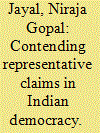

|
|
|
|
|
| Summary/Abstract |
This article essays an interpretation of representative claims articulated in the campaign for the Lok Sabha election of 2014, arguing that this election signals a shift from one dominant type of representative claim to another. The first two claims—the classical liberal view of political representation as an aggregation of preferences and descriptive representation—are embodied by the Congress Party and the social justice parties respectively. These claims are located within the universe of representative democracy, and are sought to be transcended by two new representative claims, encountered in the 2014 election. These are counter-democratic populism and realist Caesarism, signified by the Aam Aadmi Party and the Narendra Modi-led Bharatiya Janata Party, respectively. While these two do not dispense with representative democracy, their claim to provide a more effective or stronger form of democracy indicates a significant departure that redefines the relationship between representation and democracy.
|
|
|
|
|
|
|
|
|
|
|
|
|
|
|
|
| 3 |
ID:
128778
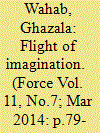

|
|
|
| 4 |
ID:
152985
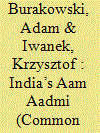

|
|
|
|
|
| Summary/Abstract |
The Aam Aadmi Party (Common Man’s Party, AAP) has taken over part of the program of the Indian National Congress. The AAP was able to include new solutions within the traditional political repertoire. In Delhi the AAP took over the traditional Congress electorate but was also able to reach out to the middle-class voter.
|
|
|
|
|
|
|
|
|
|
|
|
|
|
|
|
| 5 |
ID:
186301
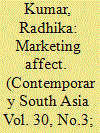

|
|
|
|
|
| Summary/Abstract |
Electoral campaigning in India is now effectively multi-modal and inhabits both the virtual and the real sphere. However, tools and techniques of campaigning vary across parties. The two parties that this paper focuses on, the BJP and the AAP, are known for running highly organized campaigns marked by their intensity and voter reach. The paper looks at the specific case of the Delhi assembly elections of 2015 and 2020 to compare strategies and the election campaign of the two parties. The paper argues that while the campaign of both parties was methodical and micro-managed, the selection of electoral issues and customization of the campaign to the addressed audience varied. The parties are comparable in terms of being leader centric, tending towards the personalization of politics, and both conducted professionalized campaigns, yet the political marketing of the element of affect differed. To demonstrate this, the paper firstly draws on literature in the field of political communication to illustrate the role of emotions, or the aspect of affect, in an electoral campaign. Secondly, through a perusal of media reportage and analysis, the paper traces the process by which personalization was manifested and how the narrative of affect came to be framed in the election campaign.
|
|
|
|
|
|
|
|
|
|
|
|
|
|
|
|
| 6 |
ID:
127952


|
|
|